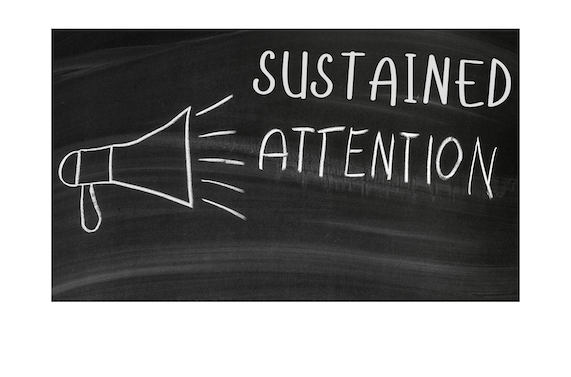
Written by Jennifer Cox LCPC
Last week we discussed Working Memory. Now let’s talk about Sustained Attention, another Executive Function.
Sustained attention, also known as focused attention, is the ability to concentrate on a task over a prolonged period of time. It’s a fundamental component of attention and cognitive processes. This type of attention is used in everyday tasks such as reading a book, listening to a lecture, or driving a car.
Someone with ADHD might struggle with sustained attention especially when the task is considered uninteresting or difficult such as work, homework, or chores. They might feel trapped by any task that takes longer than expected, so they lose focus, jumping from task to task without finishing any of them.
Now, sustained attention can be more impaired by additional factors such as fatigue, distractions, poor diet, and interest in the task – So, it is important to be aware of your self care, mindset, and environment.
Sustained attention is used in many daily activities that require continuous focus and concentration. Basically if one’s focus is required for over a period of time it involves the use of sustained attention.
Here are some examples:
1. Reading: Whether it’s a book or an online article, reading requires sustained attention to understand and absorb the information.
2. Driving: When you’re driving, you need to maintain your attention on the road, other vehicles, pedestrians, and traffic signals for an extended period.
3. Listening to a Lecture or Presentation: To understand and remember the information being presented, you need to focus your attention for the duration of the lecture or presentation.
4. Watching a Movie or TV Show: Attention is needed to follow the plot and understand the story.
5. Cooking: Following a recipe and cooking a meal requires sustained attention to ensure each step is completed correctly and safely.
6. Studying or Doing Homework: These tasks require a high level of sustained attention to understand the material and complete the assignments.
7. Work Tasks: Many jobs require sustained attention, whether it’s focusing on a project, attending to details, or dealing with customers.
8. Playing a Game: Whether it’s a video game, board game, or sport, most games require sustained attention to follow the rules, make strategic decisions, and respond to the actions of other players.
Improving sustained attention can be achieved through various strategies and exercises. Here are some suggestions:
1. Mindfulness: Regular practice of mindfulness can help improve your ability to focus and sustain attention. It trains your brain to stay focused on the task at hand and ignore distractions.
2. Regular Exercise: Physical activity has been shown to improve cognitive functions, including attention. Regular exercise can help increase your ability to sustain attention on tasks.
3. Healthy Diet: A balanced diet rich in fruits, vegetables, lean proteins, and whole grains can provide the necessary nutrients for optimal brain function.
4. Breaking Tasks into Small Steps: By breaking tasks into smaller segments, one tends to have more focus, better task initiation, a positive mindset, and an increase in attention span.
5. Adequate Sleep: Lack of sleep can significantly affect your ability to concentrate. Ensure you are getting enough quality sleep each night.
6. Breaks and Rest: Taking regular short breaks during long tasks can help maintain your level of attention. Try working for a set amount of time (25 minutes) and then take a short break (5 minutes).
7. Limit Distractions: Try to create a quiet, clutter-free work environment. Turn off notifications on your devices and try to limit interruptions.
8. Stay Hydrated: Dehydration can impair cognitive function, including attention. Make sure you’re drinking enough water throughout the day.
Understanding each of the executive functions and how they can impact your day to day, can help one understand why ADHD is a serious disorder – This is a disorder that involves self-control, self-care, self-regulation, and self-motivation to get through your day.
For more information or help with executive functioning, contact 815-363-0864 or info@echcounseling.com

